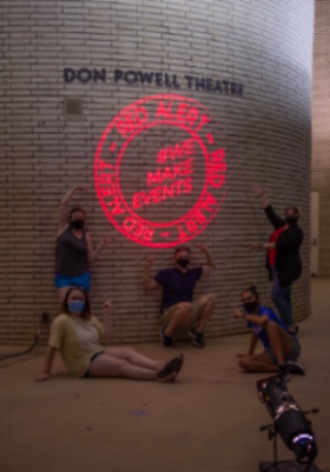Don Powell Theatre Building Glows Red in Honor of #RedAlertRestart

This global event, which originated in the United Kingdom., is an effort to make the public aware of how hard the live events industry has been hit due to the COVID-19 pandemic.
According to #WeMakeEvents, the website created by a coalition of live events workers and businesses in support of this movement, 95% of live events have been cancelled due to COVID-19 and 96% of production companies have cut staff and/or wages.
“Ever since the pandemic, this industry has been the first to shut down and we’re yet to come back, and will be the last to come back because we have to have audiences,” McMills said.
She noted the purpose of this movement is to draw attention to the huge live events economy where freelance technicians and designers are hurting the most.
“We’re a huge gig economy and one of the largest income makers for various cities, so [#RedAlertRestart] has become a huge movement…to just bring attention to the fact that the arts are suffering right now,” McMills said.
As for the actual lighting of the Don Powell Theatre building, McMills said the event was very meaningful to her and her students.
“Yes, we put six lights in the ground and turned [Don Powell Theatre] red, but there was so much love and meaning and education in those six lights,” McMills said.
She provided her graduate students with hands-on instruction and things they needed to know in regards to setting up the lights.
“I taught tons of things that evening. Lessons that can only be taught in practice. It was so valuable and meaningful to be able to produce this event in-person,” McMills said.
First year lighting and design graduate student Maile Varian said the night brought her so much joy since this was the first time she was able to do hands-on work since SDSU classes first went online six months ago.
“Anne was able to teach us a lot while we were working, and we got to know how to use equipment in a different way, that’s an experience I haven’t had in six months,” Varian said.
“Being able to have that hands-on instruction excited me and it made me want to keep working, but it also was so comforting.”
Varian said she and her peers miss the work and want to get back to learning more skills and networking.
“We miss our community, we miss our friends, and we also miss our work. This is a time for us to learn new skills and a time for us to meet new people and network with each other,” Varian said.
While the pandemic has been an uncertain time for many and halted valuable in-person instruction for live arts students, the arts are needed.
Varian said the arts are more than just a hobby, as they’ve allowed people to stay connected during this time.
“What have all of us been doing during the pandemic? We’re absorbing a lot of art, but we’re also saying ‘it’s just a hobby’ but in reality, we’re spending all of our time consuming it and it’s what’s keeping us all connected,” Varian said.
Both McMills and Varian are hopeful for the return of live events, and provided ways the SDSU community can help support the industry.
“The community can support by reaching out to their legislature and demanding that the [Restart Act] will be backed and supported, so we can help all of the artists that are really hurting,” Varian said. “Just be vocal about it and have conversations.”
McMills added that writing to congress people and telling them to extend unemployment, and stressing that the arts is a very serious career in which thousands of dollars are spent for this type of education, is another way people can show their support.
She also emphasized that support from non-arts people is just as important as well.
“We need [non-arts people] to believe in us,” McMills said. “Because everybody is interconnected and having other people writing to their legislature about it could really matter.”
